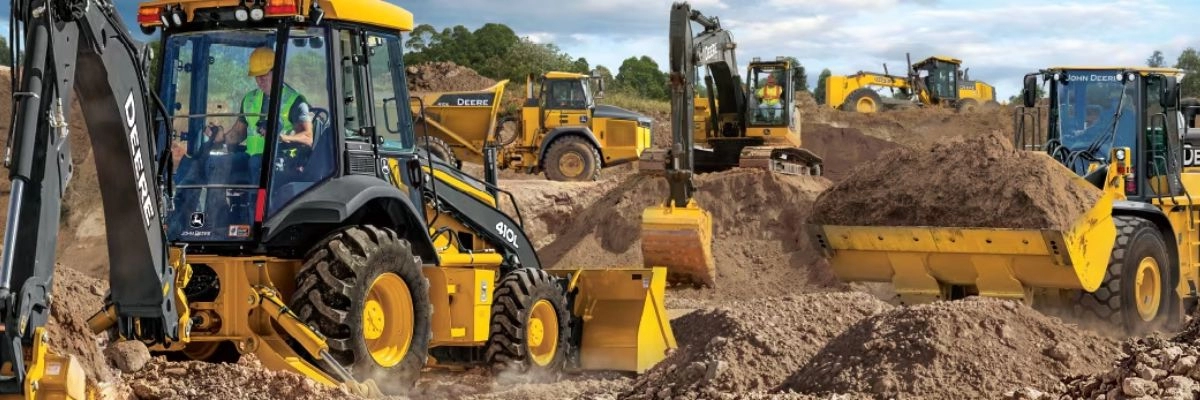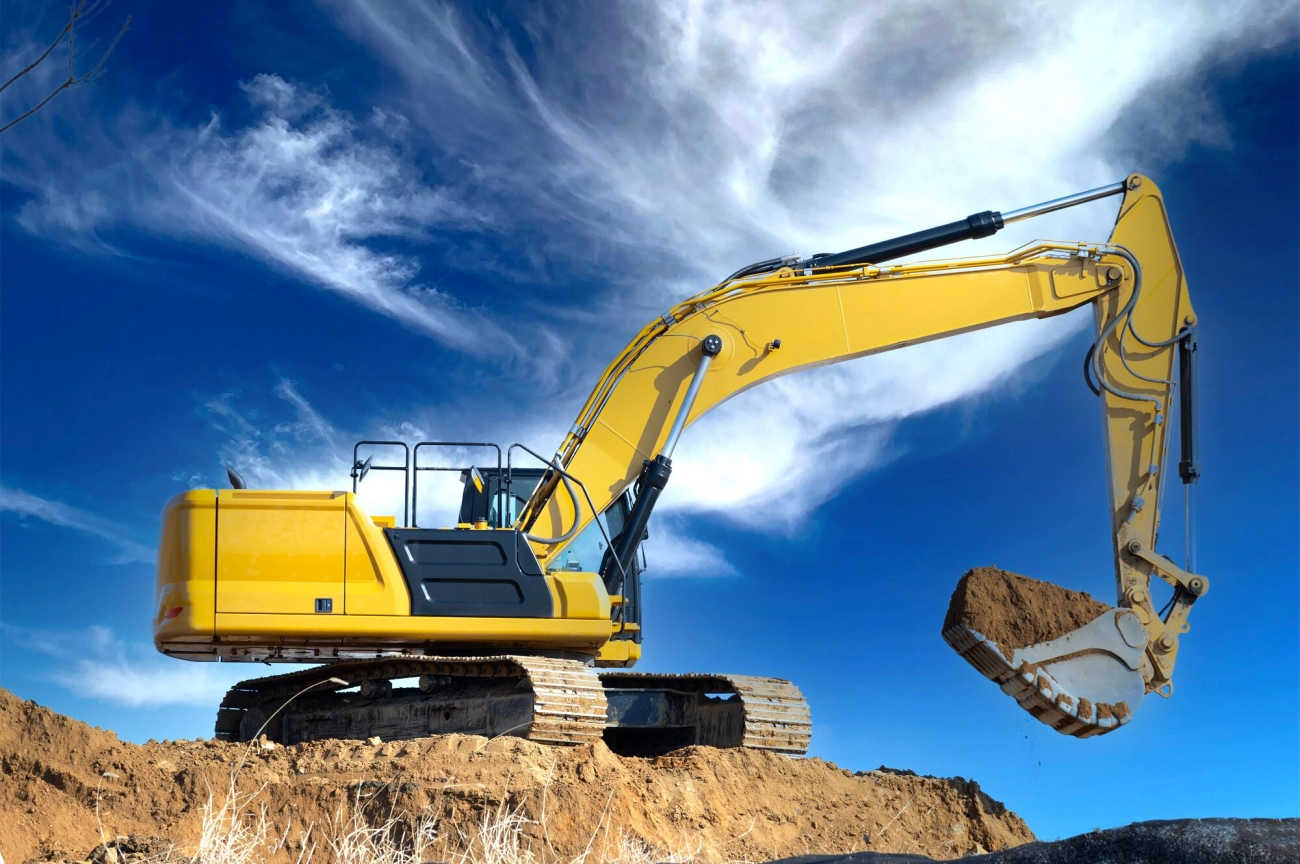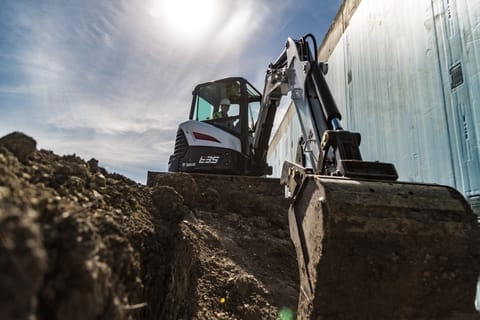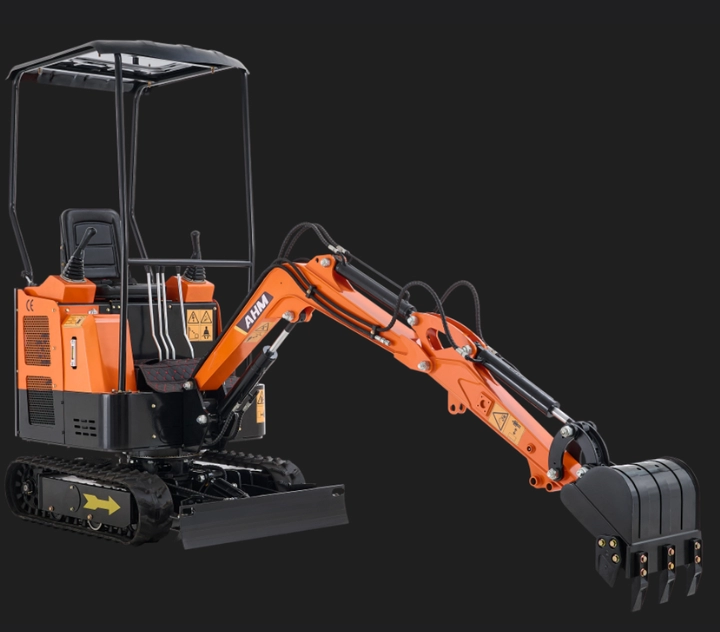-
Shandong Province, China

What is excavation engineering? Explanation of construction types and applications of small excavators
What is excavation construction
Excavation construction refers to the process in building projects where specialized machinery is used to dig, move, and clear ground or underground soil and rocks. It is an essential foundational step in the entire construction process, providing the necessary conditions for subsequent foundation treatment, infrastructure installation, and overall building development.
On construction sites, the main roles involved in excavation work include:
- Land PreparationClear the loose surface soil and obstacles to create a stable foundation for construction.
- Foundation ConstructionEnsure that the foundation is embedded in solid soil or rock to support the weight of the building, preventing sinking or uneven settlement.
- Pipeline and Infrastructure InstallationExcavating trenches for water pipes, cables, and sewage pipelines to ensure the safety and operation of infrastructure.
- Site landscaping and levelingAdjusting land height and slope to achieve drainage and aesthetic purposes.
Excavation work not only involvesearthmoving and excavationbut also includes different operational techniques and methods to adapt to various terrains and project requirements. Its professionalism determines the safety, stability, and progress efficiency of the entire construction project.
In summary,excavation is the cornerstone for ensuring the structural integrity of the construction site and the quality of subsequent work, playing a key role in improving efficiency, saving costs, and preventing safety accidents.In Taiwan's diverse geographical environment, choosing the appropriate excavation construction plan and equipment is crucial to the success of building projects.
Types of Construction Excavation Explanation
InConstruction ExcavationDepending on the work content and geological conditions, excavation methods are divided into various types. Understanding theseTypes of Excavation Methodsnot only helps in selecting suitable equipment but also ensures construction efficiency and safety. The following are the main types of excavation explained:
Topsoil Excavation
Topsoil excavation mainly involves removing the organic layer and loose soil from the surface. This layer of soil is usually rich in nutrients but not suitable for direct use as a building foundation. This type of excavation is important for land leveling and subsequent construction, especially whenLandscape Planningand agricultural land preparation are common.
Stripping Excavation
Stripping excavation refers to removing non-construction soil layers from the surface, different from simply removing topsoil, but targeting the entire unstable or excess soil layers. This operation is often used for preparationfoundation groundto ensure the bearing capacity of the foundation is sufficient.
Earth Excavation
Earth excavation is the most common construction excavation, involving the removal of large amounts of natural soil to reach the design elevation. Whether constructing building foundations or road subgrades, earth excavation is required. This process often uses small excavators, suitable for narrow construction sites and complex terrains.
Rock Excavation
Rock excavation is used when encountering hard rock or tough gravel. This type of excavation usually requires blasting or specialized rock drills, with lower automation and longer construction cycles. It is especially important for mountain foundation projects and tunnel excavation.
Trench Excavation
Trench excavation is mainly used for constructing underground pipelines, cables, or foundation walls. This type of excavation is shallow in depth but long in length, with a narrow and elongated shape. Trench safety is critical during construction and must be strictly enforced.Trench Safety RegulationsPrevent collapse.
Dredging and Underwater Excavation
Dredging refers to the removal of silt from riverbeds, ports, or reservoirs, often used in aquatic environments. This type of excavation requires specialized equipment and techniques to ensure waterway stability and environmental protection. Such excavation is frequently used in coastal engineering projects.
Differentexcavation methodssuitable for various construction sites and project requirements, choosing the appropriateexcavation equipmentand techniques, such as the small excavator we recommend, can significantly improve construction efficiency and safety. Understanding these excavation types can make the construction process smoother and reduce accident risks.
Main uses and applications of excavation construction
Excavation construction plays an indispensable role in various building projects. Depending on different needs, there are several commonexcavation purposesEach use case has an important impact on ensuring project quality and efficiency.
Foundation preparation
Foundation preparationOne of the most fundamental uses of excavation construction. By removing soil or rock, it ensures that the building foundation can securely support future structural weight. In many earthquake-prone areas, proper foundation excavation is even more critical for structural safety.
Installation of public utilities, electrical, water, and sewage systems
Excavation construction is commonly used for installing undergroundwater pipes, electrical conduits, and sewage pipelinesThese utility installations require precise and safe excavation work to ensure pipeline integrity and facilitate future maintenance.
Landscape renovation and terrain adjustment
In landscape construction andterrain modificationIn terms of, excavating can effectively adjust terrain elevation, improve drainage systems, and enhance the value of space utilization, making it especially suitable for park, recreational area, or large residential development.
Road and highway base preparation
Road or highway projects under construction must undergo large-scale excavation to preparesubgrade baseto ensure surface smoothness and load-bearing capacity, which is the foundation for successful installation of durable roads.
Site clearing and debris removal
Excavation work also includesconstruction site cleanupIncluding the cleanup of debris after demolition and land leveling to clear the workspace for subsequent construction activities.
Overall, excavation work is not just earthmoving but also the foundation for ensuring smooth project progress and long-term durability. Understanding these common uses can also help in selecting the appropriateexcavation machinerysuch as our recommended HYExcavator small excavator, which is versatile for various working conditions.
Complete analysis of excavation construction process
in the United StatesExcavation constructionis crucial to master the correct steps, ensuring project efficiency and safety. Below is a basic process for excavation construction, with special emphasis onsmall excavatorsapplications, meeting local site space and operational needs.
1. Construction Site Assessment and Survey
Before construction, the site must be prepared.Comprehensive EvaluationIncluding topography, soil quality, hydrological environment, and underground facilities (such as cables and water pipes) survey.
- ThroughTopographic SurveyWithUnderground detection, ensure that subsequent excavation does not damage the existing structure.
- Assess construction difficulty, estimate equipment needs and working hours.
2. Marking and layout delineation
Based on the design drawings, proceed withaccurate marking and staking outto confirm excavation scope and depth.
- Avoid mistakes in location or depth during this stage to prevent rework.
- Especially on small urban sites, markings need to be detailed and closely communicated with the construction team.
3. Use excavators for digging
small excavatorsConstruction sites in Taiwan are popular due to narrow spaces and complex alleys.
- Commonly used for trench excavation, foundation digging, and light earthwork operations.
- Small machinery is flexible, easy to operate, and can effectively improve construction efficiency.
- Choose professional brands like HYExcavator, with stable equipment and easy maintenance.
4. Earthwork transportation and cleanup
The excavated earth needs tobe properly removed or reused。
- according to regulations, take the earth away from the site or use it for leveling.
- Avoid soil accumulation that causes site congestion, affecting safety and subsequent operations.
- At the same time, pay attention to preventing dust and construction waste from impacting the environment.
5. Safety and Environmental Protection Measures
Safety is the top priority in excavation construction, and each step must comply with relevant standards.
- Trench safety support and collapse prevention measuresMust be implemented.
- Operators should receive professional equipment operation training.
- The site should have environmental protection facilities to control soil erosion and dust pollution, meeting environmental standards.
The above steps constitute a completeexcavation construction processFamiliar with each step to ensure project safety and smooth completion. Especially under diverse terrain and strict regulations, selecting appropriatesmall excavatorsand meticulous management are crucial for improving project quality.
Introduction to Excavation Equipment
During excavation, equipment choice directly impacts efficiency and quality. Traditional heavy machinery such as large excavators, bulldozers, and loaders are common, mainly used for large-scale earthwork and rock excavation. These heavy machines are powerful, with deep and extensive digging capabilities, but require high operational space and have limited flexibility. For sites with diverse and confined environments, they may not always be ideal options.
Role and advantages of small excavators
Small excavators, especially those weighing between 0.8 to 2.0 tons, are popular on construction sites due to their high maneuverability and compact size. Themain advantagesinclude:
- Adapt to confined construction sites: Can easily operate in narrow alleys or construction sites.
- Multifunctional operationSuitable for light earthwork excavation, trench digging, and precision operations.
- Cost-effective: Lower operating and maintenance costs compared to heavy equipment.
- Less environmental impactPower system optimization, reducing noise and emissions, compliant with environmental requirements.
These performances are particularly suitable for urban infrastructure, water and electricity pipeline installation, and small-scale renovation projects.
Why choose HYExcavator small excavators
HYExcavator focuses on producing small excavators that meet the needs of the market, ranging from 0.8 tons to 2.0 tons (such as models 08, 12, 15, 17, 17H, and 20), all with the followingcore advantages:
- reliability and durability: sturdy structural design to ensure long-term stable operation.
- Easy to operate: user-friendly interface and flexible operation to reduce learning curve.
- Energy Conservation and Environmental Protection: compliant with the latest emission standards to reduce environmental impact during construction.
- After-sales support is comprehensive: Maintenance service points are available, providing quick technical support and parts supply.
Choosing HYExcavator is not only selecting a small excavator but also injecting efficiency and stability into your construction projects, especially suitable for facing diverse terrains and urban construction needs.
Key safety points and protective measures for excavation construction
InExcavation constructionSafety is of utmost importance and cannot be overlooked. Whether operating a small excavator or large earth-moving machinery, strict adherence to safety regulations ensures personnel and equipment safety and prevents project delays.
Trench safety and preventing soil collapse
- High risk of trench collapse, one of the most common hazards at excavation sites. Supports, slopes, or protective barriers must be installed according to engineering standards to reduce soil sliding risks.
- Regularly check the stability of trench side slopes, especially during rainy seasons or when the soil is loose, to prevent workers from entering unreinforced areas.
- Usea small excavator suitable for trench depthto reduce vibrations on the slope and lower the risk of landslides.
Mechanical operation safety regulations
- Operators must undergo comprehensive excavator safety training and be familiar with the operation methods and limitations of small excavators.
- Before each use, inspect the machinery condition, such as hydraulic pressure, brakes, and warning devices, to ensure normal operation.
- Maintain a safe distance from other personnel during operation and prevent unauthorized personnel from entering the machinery area.
- Confirm that there are no buried pipelines or obstacles on site to prevent damage to underground facilities during excavation.
Environmental protection and prevention of soil erosion
- Properly conduct during the excavation processSoil and Water Conservation MeasuresFor example, set up fences to prevent soil erosion or pollution of neighboring lands.
- The construction site drainage system needs to be improved to prevent rainwater from washing away excavated slopes, causing silt and sand to flow into drainage ditches and lakes.
- Strictly control the areas where waste soil and silt are piled to prevent secondary pollution or traffic obstruction caused by improper stacking.
- Minimize noise and dust impact at the excavation site to meet local environmental standards.
In the building environment in Taiwan, theseExcavation Construction Safety GuidelinesBoth construction efficiency and environmental protection are very important, and they are also key to ensuring the smooth completion of projects. Choosing equipment likeHYExcavator's small excavatorsnot only offers agility but also allows safe operation within limited spaces, enhancing overall project safety.
By implementing the above safety measures, construction teams can not only ensure personnel safety but also effectively avoid project risks and increased costs caused by improper excavation.
How excavation impacts the success of engineering projects
Excavation plays a critical role throughout the construction process, directly affecting project progress and quality. We explain the impact of excavation on project success from three aspects, including structural safety, cost efficiency, and schedule management.
Ensuring structural integrity
The accuracy and quality of excavation are key to structural safetyWhether it is foundation excavation or pipeline installation, proper handling of surface and underground soil can ensure a solid construction foundation. If the excavation depth or scope does not meet design standards, it may lead to unstable foundations or structural subsidence, posing a threat to building safety.
- Precise excavation prevents structural deformation or cracks
- Properly handle soil types to prevent groundwater issues and soil erosion
- Coordinate with geological survey results to select appropriate excavation methods
Improve cost and time efficiency
Correct excavation procedures canReduce construction costsand avoid rework and material waste caused by excavation errors. Using high-efficiency small excavators, especially suitable for narrow construction sites, quickly completes earthwork, reducing labor requirements.
- Accurate excavation reduces unnecessary operations and construction errors
- Mechanical equipment improves earthwork transportation and clearing speed
- Planned excavation operations facilitate smooth connection to subsequent processes
Avoid project delays and additional costs
If excavation is not properly planned and executed, it can easily cause schedule delays, leading to extra expenses. This is especially important in the market because most project sites have limited space, and any delay can chain-react and affect other construction phases.
- Strictly adhere to safety regulations to prevent accidental work stoppages
- Timely removal of waste soil maintains site cleanliness and construction flow
- Preemptively handle underground obstacles or unexpected situations
Overall, excavation construction is not just about digging earth; it is the cornerstone to ensure the smooth, stable, and efficient progress of the entire building project. Choosing the right equipment and professional team, such as our HYExcavator's small excavators, can help you maintain an advantage in complex terrains and improve the overall project success rate.
Why choose HYExcavator as your small excavator supplier
Company Introduction
HYExcavator is a leading brand in Taiwan focused onmanufacturing and supplying small excavatorsoffering various models ranging from 0.8 tons to 2.0 tons (08, 12, 15, 17, 17H, and 20 models). We are familiar with the demands of the local construction market and dedicated to providing efficient equipment suitable for on-site environments.
Product Advantages Reliability and Efficiency
Our small excavators have the followingKey advantages, very suitable for local construction needs:
- reliability and durability: using high-quality materials and precise assembly to ensure long-term stable operation.
- Compact body: suitable for narrow construction sites in cities and mountainous areas, flexible operation without occupying space.
- High-efficiency power system: saves fuel, improves excavation efficiency, reduces operating costs.
- Multifunctional applicationsIncludes various engineering needs such as foundation excavation, pipeline installation, and landscaping.
Customer support and after-sales service
Choosing HYExcavator is not only about purchasing equipment, but also about making a choiceComprehensive service support:
- Professional technical consultation: Assisting with model selection and operational advice based on construction site needs.
- Fast maintenance and repair: Local repair team and original parts supply to ensure stable machine operation.
- Operational training services: Providing safety operation and maintenance training to improve construction efficiency and site safety.
- Flexible leasing options: Providing short-term or long-term leasing plans to meet project needs, flexible and adaptable.
Choose HYExcavator to make yourconstruction excavation work easier, more efficient, and more reliable.Whether it's small-scale foundation excavation or detailed gardening projects, our products and services are your best partners.





